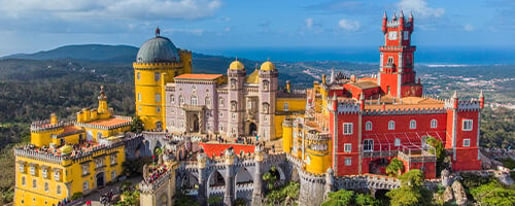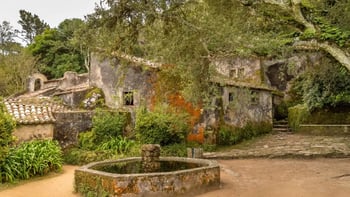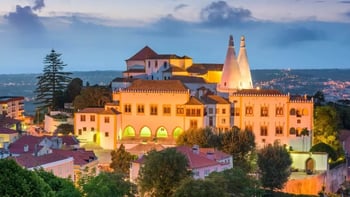What makes the Convent of the Capuchos a unique experience in Sintra, and what can visitors expect to see inside?
The Convent of the Capuchos stands out for its humble architecture and the monks’ devotion to simplicity. Visitors can explore tiny cork-lined cells, rustic chapels, and lush gardens set amid a tranquil forest, offering a serene glimpse into a centuries-old monastic lifestyle.

Where is Monserrate Palace and Park located, and what highlights await travelers there?
Monserrate Palace and Park lie just outside Sintra’s historic center. Visitors will find an eclectic palace blending Moorish, Gothic, and Indian influences, surrounded by botanical gardens filled with exotic plants and themed landscapes, creating a romantic and visually stunning retreat.

How can visitors appreciate the Castle of the Moors, and why is it historically significant?
Travelers can walk along the castle’s ancient walls, admire panoramic views of Sintra’s hills and coastline, and explore centuries-old ruins that date back to the 9th century. Its strategic location and layered history—from Moorish origins to later Christian reconquests—make it a compelling site for history lovers.

What is the National Palace of Sintra known for, and what can visitors discover inside?
The National Palace of Sintra is renowned for its distinctive twin chimneys, opulent interiors, and 1,000 years of royal history. Inside, visitors can explore richly decorated rooms, admire a mix of architectural styles, and learn about Portugal’s monarchy while wandering through peaceful gardens.

Why should travelers visit the National Palace and Gardens of Queluz, and what sets it apart?
The National Palace of Queluz offers an elegant glimpse into 18th-century royal life, boasting ornate Baroque and Rococo architecture, ornate rooms, and meticulously landscaped gardens. This former royal residence provides a refined, cultural experience beyond Sintra’s town center.
What makes Quinta da Regaleira a must-see attraction, and what can visitors explore there?
Quinta da Regaleira is renowned for its mystical symbolism, Gothic-inspired palace, and enchanting gardens filled with secret tunnels, lakes, and the iconic Initiation Wells. Visitors can discover hidden passageways, intricate carvings, and a blend of architectural styles reflecting esoteric traditions.

How does Pena Palace stand out among Sintra’s landmarks, and what should visitors expect?
Pena Palace, perched atop a hill, is a vibrant Romanticist masterpiece featuring vivid colors, fanciful turrets, and sweeping views. Visitors can roam its eccentric interiors, stroll through the surrounding park’s lush greenery, and enjoy one of Portugal’s most recognizable and picturesque panoramas.

Where can travelers purchase tickets for these Sintra attractions, and are skip-the-line options available?
Tickets can be purchased online or at the respective entrance of each site. Many attractions, including those listed, offer skip-the-line or fast-track entry options through platforms like Megapass, ensuring a more efficient and stress-free visit.
Are audio guides or guided tours offered at these Sintra landmarks, and how do they enhance the experience?
Yes, many sites in Sintra, including major palaces and gardens, provide audio guides and sometimes guided tours. These resources offer historical context, explain architectural details, and share hidden stories, allowing visitors to appreciate each place’s cultural and historical significance fully.
What is the best time to visit these Sintra sites to avoid crowds and make the most of the experience?
Visiting early in the morning or during weekdays, especially outside the peak summer season, generally ensures fewer crowds. Spring and autumn offer mild weather and a relaxed atmosphere, allowing travelers to enjoy Sintra’s enchanting palaces, gardens, and castles at a leisurely pace




